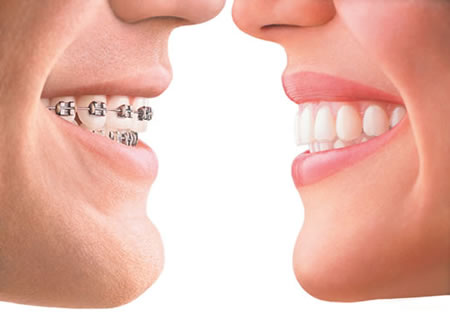If you’ve been reading a lingual braces blog and feel that a discreet form of tooth straightening treatment is what you need, then you might also want to take a look at what Invisalign offers Manchester patients. While both lingual braces and Invisalign treatments are indeed discreet, there are some differences. Our orthodontist Manchester explains….
Lingual braces
If you’re looking for a discreet form of orthodontic treatment then lingual braces are about as discreet as conventional bracket and wiring style braces get. Why? Because unlike traditional metal braces, the brackets of lingual braces are attached to the rear of the teeth, so all the action happens at the back. For this reason when you smile or speak the person that you’re speaking to or smiling at, won’t see that tell-tale glint of metal. Lingual braces work by applying continual gentle force to pull the teeth back into position. Just like Invisalign aligners, lingual braces are what is known as full-term treatments and can fix a wide variety of orthodontic problems including over/underbites and cross bites, plus helping to maintain correct teeth spacing. Because lingual braces are fitted to the rear of the teeth it does require specialist training. As a result not every orthodontist in Manchester will offer it. However those that do, suggest that it’s every bit as successful as many other brace systems.
Invisalign Aligners
Just like lingual braces, what Invisalign offers Manchester patients is complete discretion. However that really is where the similarities end. Whereas lingual braces are fixed and utilise conventional brackets and wiring to move teeth, lingual braces are fully removable and use a series of clear acrylic aligners which help the teeth move in a natural way. Each acrylic aligner is worn over the teeth, just like an invisible gum shield, and is designed to move teeth to a certain position before the next aligner in the series takes over. Patients can expect anywhere between 24-36 aligners during treatment but in some cases there may be more. Treatments last on average 18 months but can take up to 3 years. While any good lingual braces blog will tell you that they take some getting used to, Invisalign aligners are usually worn with no problems from the start. Finally and just like lingual braces, Invisalign aligners can also treat a wide variety of dental problems.
So there you have it! Hopefully this Invisalign/lingual braces blog has given you all the information you need to make an informed dental decision about what Invisalign offers Manchester patients vs lingual braces. If you’re still in doubt and need further assistance, then come and talk to our orthodontist Manchester today. Book yourself an appointment on 0161 660 1218 and take the first steps towards restoring your perfect smile.


